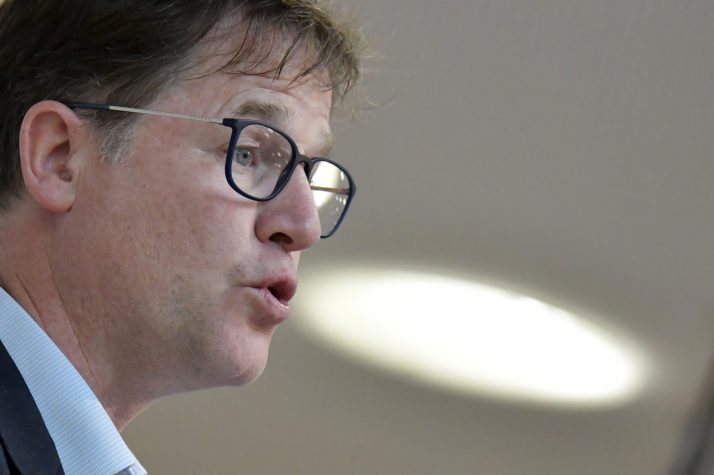Mark Zuckerberg came to Brussels looking to make friends.
But in a number of high-profile meetings Monday, European officials responded: no thanks.
Facebook’s chief executive was scolded for the company’s involvement in a series of recent scandals, asked to do more to clamp down on widespread misinformation on its global platform and urged to take greater responsibility for the role that the social networking giant plays in people’s daily lives.
The cold reception comes as the tech giant is facing mounting regulatory pressure in Europe, the United States and beyond. In response, Zuckerberg has pledged billions of dollars in resources to clamp down on everything from fake news to privacy violations — promises that have been met with widespread skepticism from policymakers across the globe.
„I spent time saying that when you have such a big position, you need to anticipate the role that you play in our societies and economies, and not wait for regulators or governments to tell you what you have to do,“ said Thierry Breton, Europe’s commissioner for internal markets.
„Facebook cannot push away all the responsibility“ — European Commission Vice President Vera Jourová
„It’s up to them to see the impact of their responsibility before we tell them so,“ the French policymaker added.
The pushback followed a full-court charm offensive by Zuckerberg to woo local lawmakers in his first trip to Brussels in early 2018 in the aftermath of the Cambridge Analytica privacy scandal.
This time, the Facebook CEO focused on high-level policymakers, meeting with Margrethe Vestager, the region’s competition chief, as well as Věra Jourová, the Commission’s vice president in charge of fundamental rights and election integrity.
His outreach included the publication of suggestions on how to regulate online content, a hot topic for European officials, and claims, during his trip to the Munich Security Conference ahead of Brussels, that the tech giant would be willing to pay more tax to countries beyond the United States in proposed digital tax reforms that may be completed by the end of the year.

European Commission Vice President Margrethe Vestager | Christof Stache/AFP via Getty Images
Zuckerberg and senior Facebook executives say that they want governments to come up with new rules to police the online world, and that it should not be left to private firms to determine how much of the digital economy is run.
But with the European Union to unveil a raft of digital proposals later this week, many of which will touch on Facebook’s core business, officials politely rebuffed many of these advances Monday, claiming the company must do more on its own to combat many of the regulatory challenges now confronting the company.
Brussels will publish new policies around artificial intelligence, the use of data and how the region will approach the global digital economy — efforts that will lead to years of hard-fought lobbying before final rules are passed.
„Facebook cannot push away all the responsibility,“ Jourová said after her meeting with the tech boss. „Facebook and Mr. Zuckerberg have to answer themselves a question: ‘Who do they want to be as a company and what values do they want to promote?'“
Wearing a blue suit and tie for his rounds of meetings inside the Commission’s Berlaymont building in central Brussels, Zuckerberg told a small group of reporters before he met with EU officials that he wanted to find a way — laid out in recommendations on Monday — to work with authorities on a model for regulating social media platforms.
His idea would be for Facebook not to be treated like telecoms firms that just carry content, with no accountability for that material, nor like traditional publishers, which have control over such content. It comes amid a growing drumbeat on both sides of the Atlantic for social media companies to be held more responsible for what users posts online, including hate speech, terrorist content and other harmful material.
„It’s not for us to adapt to those companies, but for them to adapt to us“ — European Commissioner Thierry Breton
„Given that there are more than 100 billion pieces of content a day, and that we’re not generally producing the content, I think that that would be operationally unfeasible,“ Zuckerberg said, in reference to strict content rules for Facebook and others.
Antitrust storm clouds
Despite Zuckerberg’s whirlwind schedule — which was treated more like a state visit by a national leader than a series of meetings with a corporate executive — Commission officials remain overtly skeptical of Facebook’s intentions.
Talking to reporters Monday, Breton dismissed Zuckerberg’s suggestions on potential ways to regulate online content, saying they were „too low in terms of responsibility and regulation [and] there is nothing on market power,“ in reference to Facebook’s dominance over much of social media
Breton also dismissed Zuckerberg’s proposal for a third status for Facebook that would fall between telecom provider and publisher while expressing skepticism at the idea of one single EU regulator. Taking the stage alongside the Facebook chief executive, the French official cut off the tech boss from speaking, something that Zuckerberg is not accustomed to.
„It’s not for us to adapt to those companies, but for them to adapt to us,“ he said.
Like Google and Microsoft before it, Facebook has often misjudged how to interact with policymakers in Brussels.
Officials routinely gripe that Facebook executives either do not understand Europe’s priorities or do not take their complaints seriously — something that Nick Clegg, the United Kingdom’s former deputy prime minister and former MEP, has tried to change since he took over as the company’s chief global lobbyist in early 2019.

Facebook Vice President Nick Clegg has made an effort to woo EU leaders | Tobias Schwarz/AFP via Getty Images
Clegg, who has spent much of his first year at Facebook visiting national EU capitals, attended many of Zuckerberg’s meetings in Brussels on Monday, often hovering in the back. The former British lawmaker also met with Didier Reynders, the Commission’s justice commissioner.
Still, Zuckerberg faced a tough climb in his efforts to convince European lawmakers that Facebook is now one of the good guys.
Brussels is already investigating whether the company’s online marketplace broke the region’s tough antitrust rules, though no charges have yet to be filed. An EU official said Zuckerberg’s meeting with Vestager, who runs both Europe’s competition cases and is in charge of its broader digital industrial policy, was friendly, but to the point.
„They had a good exchange of current issues in the digital sector,“ Vestager and Zuckerberg said in a joint statement.
The Dane has openly questioned whether a few digital giants should be allowed to dominate much of the online world, and has raised particular concerns about how these firms collect and use people’s online data. But she has been careful not to portray herself as against Silicon Valley, despite Donald Trump calling her the „tax lady“ for ordering Apple to repay €13 billion in back taxes. Both Dublin and the iPhone maker are appealing.
Jourová, the Czech politician who regularly speaks about her childhood growing up behind the Iron Curtain, said she had urged the millennial tech boss to do more to defend democratic values, and make it easier for outsiders to understand how decisions were made on Facebook’s platforms through its complex algorithms.
Such changes must come from the company, she said. Zuckerberg, she added, should not wait for policymakers to draw up new rules.
„It will not be up to governments or regulators to ensure that Facebook wants to be a force for good or bad,“ Jourová said.
Want more analysis from POLITICO? POLITICO Pro is our premium intelligence service for professionals. From financial services to trade, technology, cybersecurity and more, Pro delivers real time intelligence, deep insight and breaking scoops you need to keep one step ahead. Email pro@politico.eu to request a complimentary trial.
Source: politico.com
See more here: news365.stream






